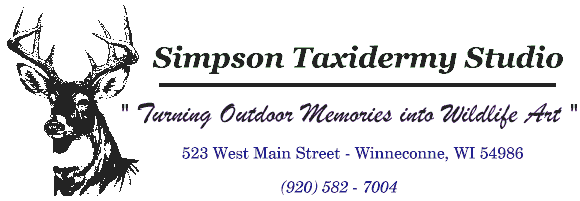BIRDS 
 GENERAL
INFORMATION ON OUR METHODS
GENERAL
INFORMATION ON OUR METHODS
 PHOTO
GALLERY - Ducks & Geese
OR Gamebirds PHOTO
GALLERY - Ducks & Geese
OR Gamebirds
 FIELD
CARE FIELD
CARE
 PRICES
our complete 2017 price list in .pdf format. PRICES
our complete 2017 price list in .pdf format.
 SHIPPING
INFORMATION
SHIPPING
INFORMATION
 PAYMENT
INFO PAYMENT
INFO
 WORK ORDER - BLANK
DOWNLOAD, PRINT AND COMPLETE
WORK ORDER - BLANK
DOWNLOAD, PRINT AND COMPLETE
 COMPLETION TIME
COMPLETION TIME
GENERAL INFO
As with
all my mounts, I take pride in my bird mounts. I
have developed some special techniques and methods
that work very well in producing a long lasting,
beautiful bird mount
Birds are skinned
with a breast incision, removing the neck &
body. Leg and wing bones are are drilled and
cleaned of meat & marrow and tendons are removed
as much as possible. After thorough degreasing
with both scissors and a wire wheel, then a soap bath
and rinse, all birds are placed in a tanning
solution. Legs and wing tips are injected with
the tanning solution. This tanning
solution was developed by me and has been used in my
studio for the last 15 years. Containing both
proven tanning agents and preservatives, I found it
"thickens" and strengthens the skin, eliminating the
fragile "potato chip skin" that the typical, dry
preserved bird mount has. After a minimum of 48
hours in the tan, the hide is neutralized, water
squeezed out and soaked in white gas to displace any
remaining water in the feathers. Squeezed dry
again to remove the gas, birds are then fluffed and
the feathers dried with a blow dryer and compressed
air. Once almost dry, the holes are sewn and
legs and wings are wired for support.
NOTE - I do NOT "tumble" my birds,
having found that it causes damage to the primary wing
feather tips, tearing of the skin if there are shot
holes and a helluva time getting all that dust out of
the feathers.
All of my birds are
mounted on Ferebee styrofoam forms, which I have found
to be the most accurate bird forms on the
market. All waterfowl use an artificial head
also made by Ferebee. I use the real skull on
game birds after it is thoroughly cleaned and all
remaining meat is removed. Necks are made
by me out of a flexible foam material and securely
attached to the head with epoxy glue. The wings
and legs are carefully placed in their proper
positions and securely wired into place. The
skin is sewn onto the form and the skin around the
bill (on waterfowl) is super glued into place.
Once positioned, much time and attention is given to
the grooming and arrangement of the feather
groups. This can take several hours or more, but
it is one of the key steps in making the bird LOOK
good.
back to the top
Below are just some of the
possible poses and scenes available
Waterfowl Photos
Click on thumbnail for larger image
Gamebird Photos
Click
on thumbnail for larger image
Turkey
Photos
Click on thumbnail for larger image
back
to the top
Field Care
for Birds
Birds are very easy
to care for in the field. First, you
must determine if the bird is good enough to
mount. Many birds brought in each year,
particularly waterfowl, are not fully
feathered enough to make a good
mount. Check for pin feathers by
gently lifting backwards and looking for
feathers that are not fully grown. The
back of the neck, the top of the head, the
rump and the side feathers are the areas where
pin or blood feathers are the most
common. Look also at the size of the
bird compared to other birds of the same
species. Older, more mature birds are
generally larger.
Check to see how badly hit
your bird was. If it has large holes,
wing feathers shot or broken off or more than
just a few pellets in the head area, it is
probably in too poor of a condition to
mount. If you are in doubt, bring the
bird in to your taxidermist so that he/she can
check it for themselves.
Assuming that you have a
well feathered bird that you did not shoot up,
1. Rinse
or wipe as much blood off the feathers as you
can.
2. Place
a piece of toilet paper, or other absorbent
material, in the birds mouth to help absorb
fluids.
3. Tuck
the head under or next to the wing and place
the bird head first in a plastic bag.
4. Keep
the bird as cool as you can and bring in as
soon as possible OR place in a freezer.
5.
Turkeys and other large birds may need to be
field dressed in order to keep them from
spoiling.
Make a short incision from the vent to the
base of the rib cage.
Remove the entrails and rinse the cavity with
water, then place ice inside the cavity.
Place in a cooler or bring in ASAP.
Handle the bird carefully
and try and avoid anything that might
stain or break the feathers.
Birds may also be frozen
and shipped via UPS if you live a distance
away. Please call before shipping for
complete instructions on packing and the
proper paper work to enclose.
back to the top
|
Where do you
want to go?
|

